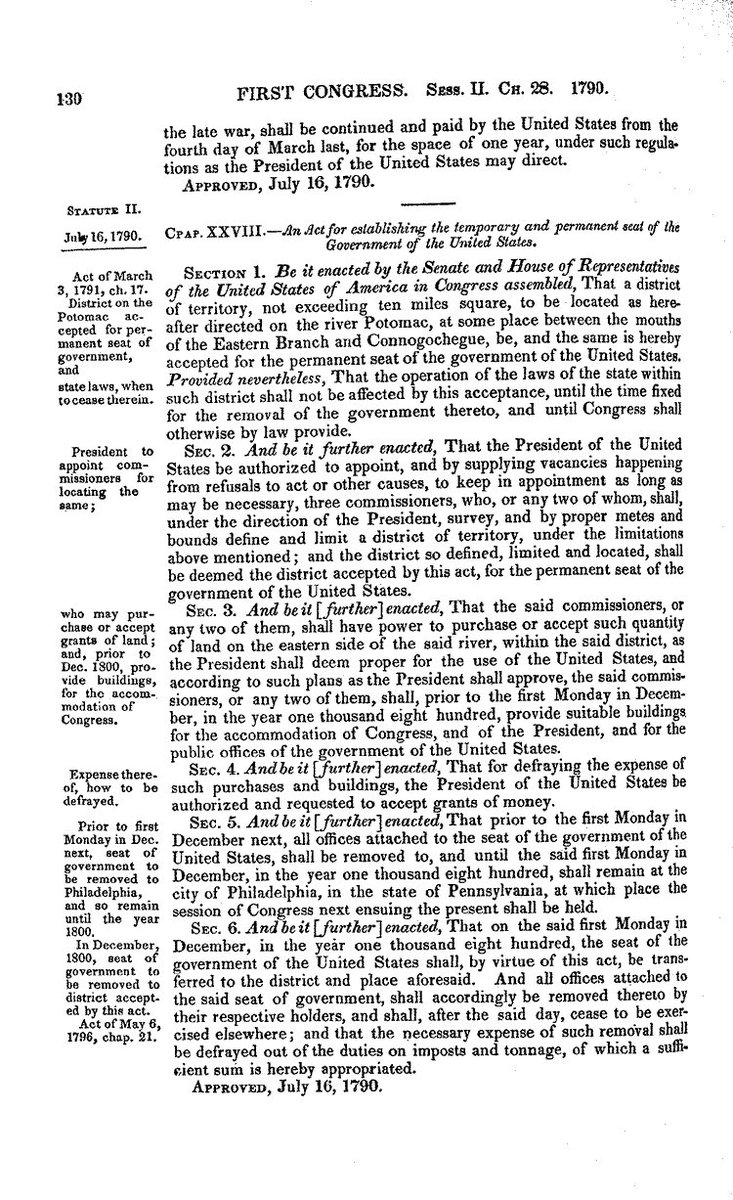1. Given all of the chatter on D.C. statehood, I thought I& #39;d post a few quick points about what the Constitution does—and, more importantly, *doesn& #39;t*—say about the location and size of the capital.
TL;DR: Admitting (most of) D.C. as a state would be perfectly constitutional.
TL;DR: Admitting (most of) D.C. as a state would be perfectly constitutional.
2. Start with the Constitution itself. Famously, it punts on the location of the capital.
All that Article I says is that Congress will have the power to exclusively regulate the land that becomes "the seat of government of the United States," which must be <= 10 square miles.
All that Article I says is that Congress will have the power to exclusively regulate the land that becomes "the seat of government of the United States," which must be <= 10 square miles.
3. Critically, the Constitution does not say (1) *where* the capital will be; or (2) whether it must be *exactly* 10 square miles. It deliberately left both of those determinations to Congress.
Enter Alexander Hamilton, the Residence Act of 1790, and "the room where it happens."
Enter Alexander Hamilton, the Residence Act of 1790, and "the room where it happens."
4. As the story (and the song) go, in exchange for agreeing to assume states& #39; Revolutionary War debts, Congress provided that the capital would be on land at a point somewhere along the Potomac River in Maryland/Virginia, to be specifically selected by presidential commissioners.
5. The 1790 Residence Act drives home two critical points about the constitutional debate:
First, the *location* of the "seat of government" was entirely at Congress& #39;s discretion. Second, as long as the seat of government was no *larger* than 10 square miles, its size was, too.
First, the *location* of the "seat of government" was entirely at Congress& #39;s discretion. Second, as long as the seat of government was no *larger* than 10 square miles, its size was, too.
6. The best evidence of this latter point comes in 1846, when Congress "retroceded" the VA portion of D.C. back to VA (at least in part in response to legislative proposals to abolish slavery in "the District of Columbia"), thus reducing the "seat of government" to ~68 sq. mi.
7. If the "seat of government" doesn& #39;t have to be 100 sq. mi., then it could just as easily be 1 sq. mi. And so even if it& #39;s unconstitutional for a state to exercise dominion over the "seat of government" (but see PA from 1790–1800), the "seat" can be just a small slice of D.C.
8. At most, then, constitutional arguments against D.C. statehood are arguments against statehood for every square inch of D.C. But proposals to preserve a small "federal district" between the White House and the Capitol / Supreme Court necessarily satisfy that concern.
9. That also resolves the awkward specter of D.C. statehood co-existing with the 23rd Amendment. That provision doesn& #39;t give *D.C.* three electoral votes; it gives three electoral votes to "the seat of government." So the tiny federal enclave would still be represented, too.
10. Of course, statehood for (most of) D.C. would likely all-but moot the practical need for the 23rd Amendment, and so repeal might soon follow. But the key for present purposes is that the *constitutional* objections to D.C. statehood are, for lack of a better word, bunk.
/end
/end
One correction: "Ten miles square" = 100 square miles, not 10 square miles.

 Read on Twitter
Read on Twitter



